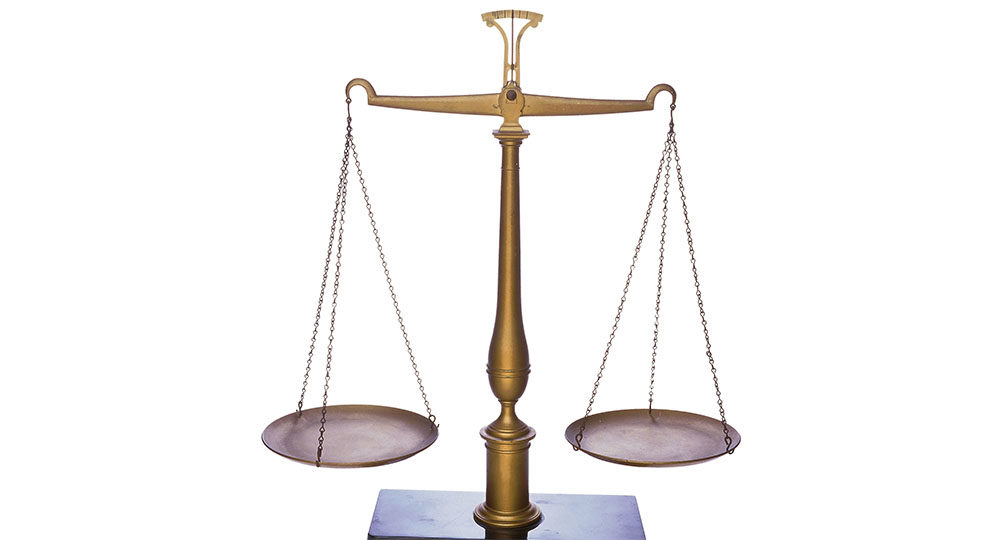Tsedek and Mishpat: The Perfect Rightness of God
There is perhaps no virtue more central to who God is and how He works in the course of human history than that of justice or righteousness. A small constellation of concepts and terms in Scripture, taken together, conveys this attribute of the triune God—the ineffable purity and righteousness of His character, the unsullied integrity and perfection of all of His purposes for His creation, and the unpolluted equity and justness with which He deals with the universe at all times and in all ways.
The two most basic Hebrew terms in the Old Testament are tsedek (usually translated “righteousness,” conformity to a right standard) and mishpat (“judgment,” in the sense of a right sentence in a court of law). In the New Testament the prevailing Greek term is dikaiosune. All three describe that which is physically straight or plumb. In the moral realm they speak of that which entirely conforms to a moral or ethical standard, activity that is unerringly consistent with what is morally demanded and/or legitimately expected.
The phrase often employed to gather together all that is at stake in these terms is divine rectitude: the perfect “rightness” of God in all that He is and does. The concept permeates and shapes Scripture, and Jesus the Messiah demonstrates that perfect divine rectitude.
Divine Rectitude and the Cross
God’s Justice in Redemption. The Scriptures affirm that in a day gone by, Jesus’ sacrificial death demonstrated God’s justice in redemption. The apostle John exulted, “The Word became flesh and dwelt among us, and we beheld His glory, the glory as of the only begotten of the Father, full of grace and truth” (Jn. 1:14). Perhaps the biggest word in that last phrase is and. John knew well that God was gracious, and he knew that God was true—that He would always act in perfect consistency with His just and righteous character.
But the believer under the Old (Mosaic) Covenant, no matter how mature, could not grasp how a thrice-holy, all-knowing God could “justify” (“pronounce righteous,” a term built on the word for “righteous” or “just”) one as fallen and wicked as himself. In other words, how could God be gracious to accept fallen human beings into fellowship with Himself and, at the same time, be true to the perfect righteousness and justice of His character? The answer was finally revealed in the life and death of Jesus the Messiah. In this sense, the living Word was “full of grace and truth.”
Though there was much mystery in the economics of God’s saving act, there was no ambiguity in His promise, which is perhaps most clearly and substantively expressed in the verse that might be termed “the John 3:16 of the Old Covenant”: “The life of the flesh is in the blood, and I have given it to you upon the altar to make atonement for your souls; for it is the blood that makes atonement for the soul” (Lev. 17:11). All through the ages before Christ, people who simply believed that promise—and thus, in faith, accepted the provision of an innocent animal dying the death they deserved—could be confident the God whose Word cannot be broken would, in fact, accept them. But the mystery was this: How can a holy God do that?
According to the apostle Paul, that grand mystery was solved by the sacrificial death of Jesus:
Being justified freely by His grace through the redemption that is in Christ Jesus, whom God set forth as a propitiation by His blood, through faith, to demonstrate His righteousness, because in His forbearance God had passed over the sins that were previously committed, to demonstrate at the present time His righteousness, that He might be just and the justifier of the one who has faith in Jesus (Rom. 3:24–26, emphasis added).
Paul’s argument is that only with Christ’s death was God’s righteousness declared. Only when Jesus, the God-Man, died a death of infinite capacity to cover the perfect righteousness of a thrice-holy God could the world understand how God could be just (absolutely true to the righteous standards of His own character) and the justifier (pronouncing those who are “in Christ” to be absolutely in conformity with those standards) of those who believe in Jesus. In short, Jesus’ sacrificial death demonstrated God’s justice in redemption.
Divine Rectitude and the Crown
God’s Justice in Retribution. The Scriptures make it clear that in a day yet to come, Jesus’ sovereign dominion will demonstrate God’s justice in retribution. The time is coming when Jesus will reign as King over all the earth: “For the earth will be filled with the knowledge of the glory of the Lᴏʀᴅ, as the waters cover the sea” (Hab. 2:14). Then every knee shall bow and every tongue shall confess “that Jesus Christ is Lord, to the glory of God the Father” (Phil. 2:11).
That reign will be inaugurated as the eschatological Messianic Kingdom is established (Rev. 11:15), and it will endure in its initial stage for 1,000 years (20:1–7). The prophet Jeremiah exulted in Yahweh’s promise regarding that reign’s righteousness: “‘Behold, the days are coming,’ says the Lᴏʀᴅ, ‘that I will raise to David a Branch of righteousness; a King shall reign and prosper, and execute judgment [justice] and righteousness in the earth’” (Jer. 23:5).
Indeed, the absolute equity of King Jesus’ rule (Isa. 9:7; 16:5; 28:5–6), as well as the security and abundance He will provide (Mic. 4:4), are central to what might be termed the “forensic function” of the Millennial Kingdom. For 1,000 years people will enjoy universal, uncorrupted justice. There will be work and provision for all, Satan’s destructive influence will be (temporarily) checked, and the utopian society humanity has longed for will be a reality. And all of it provided by King Jesus.
Then, at the end of the 1,000 years, Satan will be loosed “for a little while” (Rev. 20:3). In almost no time, Satan will gather a vast army of unsaved people to rebel against the Sovereign who has provided all of the justice, abundance, and security they have enjoyed. And thus, in the final, awful act of human rebellion, the bottomless depravity of unregenerate men will be undeniably demonstrated. The conceit of humanity is and always has been to insist that people cannot be held morally accountable for their wicked actions and that some sort of deprivation or unfairness in their experience is to blame.
After 1,000 years of uninterrupted peace and plenty, the unregenerate masses will revolt against the One who proved so wise and good for all of that time. Thus is the final nail hammered into the coffin of fallen humanity; thus is mankind’s spiritual deadness rendered incontestable.
This dynamic in God’s dealings with mankind is squandered by those systems of biblical interpretation that deny an end-times Kingdom as described throughout the Bible. But such a Kingdom is clear and central in Scripture. God will work to ensure that “every mouth may be stopped” (Rom. 3:19), that no possible excuse remains, and that man’s guiltiness is established beyond any challenge. And, according to Scripture, the Millennial reign of King Jesus—a reign of perfect righteousness and justice—is pivotal to that divine effort. In short, in a day yet to come, the sovereign dominion of Jesus will demonstrate God’s justice in retribution.







